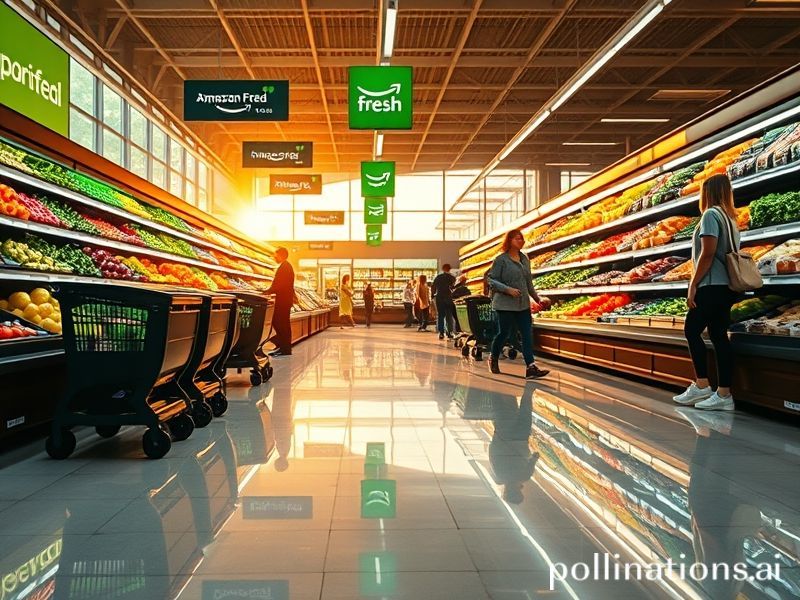No Lines, No Humans, No Problem: Amazon Fresh’s Global March Toward Friction-Free Shopping
Amazon Fresh Stores: The Checkout-Free Crusade to Make Lines Obsolete—And Maybe Humans Too
By the time you finish reading this sentence, Amazon Fresh will have opened another store somewhere on the planet, harvested another cartload of behavioral data, and quietly retired another cashier who used to know your ex’s coffee order. The expansion is swift, almost viral: from Seattle’s Capitol Hill to London’s Ealing, from Berlin’s Pankow to Tokyo’s Shibuya, the green-and-white logo is metastasizing like a polite but relentless fungus. In a world already choking on convenience, Amazon Fresh’s “Just Walk Out” technology is pitched as a cure for the minor inconvenience of human interaction. Swipe your palm, grab your kombucha, and vanish into the night—capitalism’s answer to shoplifting with permission.
The mechanics are deceptively simple. Ceiling-mounted cameras, shelf-weight sensors, and machine-learning models track every item you fondle, covet, or ultimately abandon beside the gluten-free baguettes. Your phone—or, for the truly committed, the biometrics of your hand—settles the bill automatically. Amazon insists the system is “frictionless,” a Silicon Valley euphemism for “we removed the part where you notice how much you’re spending.” Critics call it surveillance retail. Shoppers mostly call it fast. Somewhere between those two poles, a new international etiquette is forming: pretend you’re invisible while being watched by two dozen infrared eyes.
Globally, the rollout has been a masterclass in cultural adaptation. In the United Kingdom, where queuing is a quasi-religious ritual, Amazon Fresh stores are deliberately small—just enough room for eight anxious Brits to practice their new religion of not queuing. In Germany, privacy regulators required Amazon to paint the cameras festive colors so they look less like Orwellian gargoyles. In Japan, the stores stock high-end bento boxes and bow politely at the exit, because even an algorithm must respect local notions of courtesy. And in India—where mom-and-pop kirana stores still account for 90 percent of grocery sales—Amazon Fresh’s parent company has adopted the strategy of simply buying the neighborhood, a technique the British East India Company would recognize with a nostalgic tear.
The broader significance is hard to miss unless you’re too busy scanning your own palm like a low-budget spy thriller. Amazon is exporting a template for urban life that reduces every transaction to metadata. Municipalities from Singapore to São Paulo are courting the company with tax breaks, thrilled at the prospect of futuristic foot traffic. Meanwhile, labor unions from Chicago to Milan are filing the same complaint: if no one is checking you out, eventually no one has a job checking you out. The World Economic Forum estimates that retail automation could displace 85 million positions by 2025; Amazon prefers to cite the “new jobs” maintaining servers that watch you buy toilet paper in real time.
Environmentalists have their own grievance. Each store is a humming data center wrapped in kale and oat milk, consuming electricity equal to a small village just to ensure no teenager can sneak out with a can of Monster. Packaging waste rises too, since the grab-and-go model favors individually wrapped bananas over the old-fashioned produce section where fruit once dared to touch air. In response, Amazon pledges to be net-zero by 2040, a date so comfortably distant that most of its current executives will be retired on private islands by then, sipping coconut water delivered by drone.
And yet, the stores thrive because they scratch a universal itch: the desire to feel simultaneously pampered and invisible. We want frictionless everything—love, politics, groceries—until the day we realize the friction was the only thing keeping us human. By then, the cameras will have archived our guilty midnight ice-cream runs, the algorithm will have suggested a healthier alternative, and the cashier who once flirted awkwardly while ringing up condoms will be retraining as a data janitor, wiping fingerprints off touchscreens that no longer need touching.
In the end, Amazon Fresh stores are less about groceries than about rehearsal: a daily, global dress rehearsal for a world where identity is a barcode, attention is currency, and the only line you’ll ever stand in is the invisible one between your own impulses and the gentle nudge of predictive analytics. Bon appétit.







